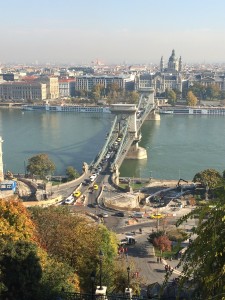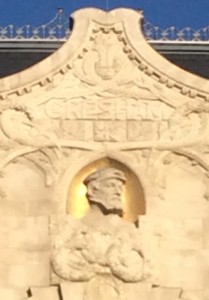05 November 2015
A Fading Strangeness
By Chin Chin

Just how much is 10,000 forint? That’s the Hungarian forint, of course, and to work it out one has to remember the exchange rate. I know, there was a 23 in it somewhere. Divide by 23 perhaps? That would be about £434, rather a lot for the ride from the airport. Perhaps one should multiply, then: £230,000 and, after knocking off a few zeros to tidy up, £23. That seems about right. Oh dear, they are all gabbling away at me in some foreign lingo. Well, I know that I only changed £100 and it’s about a quarter of what they gave me. Ok, hand over the note and hope for the best. He looks happy but not jubilant. Must have got it about right.
It is so nice to be outside the Eurozone and to handle proper notes with real Hungarian heroes on them rather than the ubiquitous Eurochip. True, the maths is less instinctive; but wrestling with the exchange rate and wondering if you are out by a factor of ten used to be one of the things that made foreign countries foreign, rather like driving on the wrong side of the road and people never speaking slowly enough for you to understand. It got exciting too in times of political uncertainty, and I remember hearing about a very wealthy man who travelled Europe just after the war with his family and staff to find that, because he had changed large amounts of cash at each border and the exchange rates had moved in his favour, he had actually ended up with more money than he started with. Obviously it could have gone the other way, but what an exciting gamble. You couldn’t get a better thrill in a casino.
Overcoming local difficulties used to be one of the great pleasures of being abroad. Quite apart from the money, there was navigating the foreign road system armed only with a map and, if you were wise, a compass stuck to the dash board. Then there was dealing with foreign shops and taking rooms at foreign hotels, not to mention booking the occasional call back to the UK through a series of international operators. There you would be, enjoying some local aperitif when the patron would emerge onto the terrace to tell you that the call you had booked to London had now come through. A crackly line, plenty of misunderstandings of the “Budapest, not Bucharest” variety and a feeling of triumph when one got one’s message across. It was an evening’s entertainment in itself.
Alas, you have to go a long way for that sort of fun now. English is almost ubiquitous; hotels can be booked online; the same shops appear in each city; the hire car has its satnav and the croissant you enjoy at your first breakfast abroad is rather like the ones that you get back home. None of it is as foreign as it was.
Actually, I expect that every generation has felt rather the same as progress takes features of home life out to the provinces. Did the Roman centurion, as he entered his centrally heated quarters in some far flung province, feel a degree of disappointment that it was so like home? No doubt he consoled himself with the reflection that it was also very comfortable – in much the same way as we might nowadays be relieved that they take American Express.

Certainly the Edwardian visitor to Budapest would have seen touches of his homeland. At the end of the Chain Bridge, in the heart of the city, there was an office building and way above the door there was a statue of a man. Who is he? Some early Habsburg emperor? A military hero from the struggle against the Turks? No, his name is Gresham and the building was constructed as the overseas headquarters of the Gresham Life Assurance Company of London. It is now a magnificent hotel.
If “abroad” becomes too familiar for the tastes of the romantic, there is another side to the story. It becomes safer and more convenient too. The Roman centurion was protected by Pax Romana and the Edwardian visitor to Budapest could rely on the muscle behind his British passport. Similarly our travel is made easy and safe by the very factors which make it less exciting. If it wasn’t for them we probably wouldn’t be there at all. So it’s no use bleating about how the modern world has spoiled tourist destinations. It has certainly changed them and made them more familiar, but if it is something different you crave – why, I believe that holidays in Kabul and Damascus are very reasonably priced at the moment.

